- Home
- Jane Arbor
Return to Silbersee Page 13
Return to Silbersee Read online
Page 13
The new factor took the shape of a prominent advertisement in the Gutbach Tageblatt for a considerable additional number of men required by Adler Classics as tree-fellers and builders for the von Boden estate. Wilhelm brought the paper to Juliet, said, 'There is also a poster on the wall of the Wirtshaus and waited for her comment.
She read through the advertisement. 'They want fifty more men. That's a lot,' she mused aloud.
'For the Klinge Platte—the sawmill site. They are in a hurry. And see the wages they are offering. It makes one think,' said Wilhelm.
'You were wondering whether some of our people might be tempted? When we talked before you advised me against letting them know I feared they might leave. But oughtn't I to test what they are feeling now?' Juliet appealed.
'I know what they are feeling now. They are talking among themselves at the benches. And though some of them are fools to see themselves as timbermen or builders, money of that figure does talk, Fraulein.'
'Supposing they all went, all twenty of the able- bodied ones, what should we do? We should have to close the School.'
Wilhelm shrugged. 'They are not likely to troop out in a body. Some will take longer to make up their minds than others. Some will go, driven by their wives, some may have the sense not to go at all. But there is nothing you can do, Fraulein, unless you can match this kind of pay or better it.'
'Which you know I can't,' said Juliet. She saw it all now, and she couldn't claim she had not been warned. Karl had threatened that he had ways of defeating her; her eavesdropping on Ilse Krantz had spelled them out and her own intuition had told her they could be real.
Her outraged imagination took a wild, extravagant turn. So the School was to be smoked out, as if it were a nest of vermin! She had allowed Magda to persuade her Karl meant it no harm. But he had only been biding his time. He had changed his plans for the sawmill site, in order to push it forward as an emergency for which the firm was prepared to pay wages out of all relation to the local rate. He had known and calculated such money's attraction for the Rutgen men, among them her workers on whose defection he was counting and would probably get.
How could he be so petty? How could he? Or did he hate her so much that no revenge was too mean or paltry to use against her? And how could she have betrayed her own self-respect as to think she was in love with him? Now all she wanted was the chance to confront him, to tell him she knew just what he was about, and to make very sure that, though she couldn't win, her scorn of his methods got through to him.
But for that dusty satisfaction she had to wait to see how far and how soon he was going to succeed in bribing her workers to leave her, and in the meanwhile she listened to Wilhelm's persuasion that so far the men were only talking, not acting, and that until they did, she had nothing to lose.
Patience was irksome. If the sword of Damocles of the School's fate had to fall, she would prefer it to come down with the force of a guillotine's knife. If the men meant to go, she would rather they got on with it. She wanted to prove her case against Karl, and it was only in the small hours, when her spirit was at its lowest and her self-doubt nagged, that her honesty faced a question she didn't want to answer—'Do you want to see Karl again in order to tell him what you think of him? Or do you want to see him again for the sake of seeing him again, hearing his voice, watching him move ?'
By day she could tell herself she knew what the answer was. By night she wasn't sure.
She had to wait until the next weekend for the first few of her workers to hand in their notices, which she accepted stoically, too proud to appeal to their loyalty alone while she hadn't the means to make it worth their while to stay. During the next week others followed, and though they had to work out the period of their notice, all the signs were that in less than a month she would have only the remnants of a work-force, if that.
That week the Baronin was away, on another visit to her relatives in Bonn; she was so much out of step with Use's regime, Juliet guessed, that she was thankful to escape from it. As far as Juliet knew, Karl had not been over to the Schloss since the Sunday he had called to see her, when he had left her in little doubt that he would not willingly seek her out again.
So that she was completely unprepared to be called on the telephone, one morning by a woman naming herself as his secretary.
'Fraulein Harmon?'
'Speaking.'
'Herr Adler would like to speak to you. One moment, please.'
Juliet waited. Then Karl was asking, 'You will have heard that we are developing the Klinge Platte for building, no doubt?'
'Yes.'
'Well, we are having to clear it of a good deal of timber first, and as it is mosdy good beech and larch, I thought I'd remind you that your workers could probably get some useful pickings there, before the debris of the felling is burnt. If you'd dare to send them over, I'll have the foreman warned.'
Juliet was nonplussed. What was he up to—with a bludgeon in one hand and an apparent olive-branch in the other? In reply she said carefully, 'Thank you for remembering us, but I'm afraid the School may not be in much need of timber gleanings for its work in future.'
'Indeed? Why not?'
Considering everything, she found the smooth question provocative. 'Surely you should know why not,' she said.
'Why should I?—short of your closing down the School, of which I hadn't heard.'
'Nor, I suppose, do you know anything about your firm's recruiting of tree-fellers and builders at fantastic pay rates, which is draining the School of its workforce, and may well close it down?' she countered.
She heard his sharp-drawn breath of annoyance. 'You mean the local campaign we're running in the region for the increase in labour that we need? But how should that affect you?'
'At those wages, would you expect it not to?'
'But you employ a proportion of old people, the disabled, women '
'Who are the only ones we may be able to keep when all our valuable men have gone over into your camp.'
'You are convinced you'll lose them? Have any of them been taken on by us yet?'
'No, because those who have already given me notice have still a few days of it to run. But I'm not in much doubt that most of the other able-bodied men will follow them.'
'But you have students you are training to take their places?'
'We had two new ones. But they left some weeks ago. They gave no reason, but I've thought since that their parents must have been a lot wiser as to die School's probable fate than I was. Oh yes, Herr Adler'—Juliet's tone deepened with wounded anger— 'you warned me that you meant to defeat me and destroy the School, but you never revealed your tactics, did you, and how was I to guess how you planned to do it, until you did it this way, this ... this lifeblood- draining way that you knew must succeed, as long as you made your terms attractive enough?'
There was a silence which stretched out. Then: 'You are suggesting that we put out public notice for labour we need in a hurry, at wages we are fully prepared to pay to get what we want, merely in order to squeeze a paltry little wood-carving joint out of business? Is that what you think?' Karl scorned.
'You had threatened to squeeze me out, so what else could I think? And I must have been the only fool who didn't know what you were at. Other people knew or guessed before I did—Frau Krantz, for one.'
'Ilse? Indeed? And did she confide my perfidy to you?'
'No.'
'Then how do you know she knew?' he pounced.
She couldn't confess her eavesdropping to him. 'Never mind,' she said coldly. 'Anyway, you've got your result, haven't you, or will achieve it, you hope?'
Surprisingly he agreed with a flat, 'As you Say. The result is the things And when all your employees are working for me, and you are telling yourself that I snatched the last crust of your livelihood from your mouth, you might do worse than remember the rough justice of the adage that All's fair in love and war.'
'Yes, indeed! That to you, all's fair in war—I'll cer
tainly remember that!' she flared.
But she spoke to an empty line. Karl had already rung off.
Juliet was tempted to say nothing in the workshops about Karl's offer. As she had told him, their raw material wasn't a present problem. But as she was reluctant to let it be thought that the School's future was in jeopardy, and as she knew Helmut Jager at least was short of the deep-grained larch he needed for his models, she gave out the news.
She herself walked over to the Klinge Platte that evening after the fellers had stopped work for the day. She was saddened by the sight ol the proud beeches and slender larches which had been the day's 'bag', not yet roped and chained for carting. But better, she supposed, that trees should fall than that people's homes should be destroyed to make room for Karl's sawmill. And whether her stand had defeated his patience, or he had been generous, as Magda claimed, at least the Lakeside folk and the School had been spared that.
The first foray showed that there was a lot of good waste to be gleaned on the Platte. On most days of that week parties, among them Helmut and his guide, Edmund, went over to explore and compete for finds. The activity became a draw for sightseers too. Tourists' cars gathered, and villagers with time on their hands walked or rowed over, all agog for the free spectacle of the regimented work on hand—the roping of marked- down trees, the lopping of their minor branches, the manoeuvring into position of the hydraulic saws which had outmoded the woodman's axe, and the drama of the final warning shout of 'Timber!' which echoed back into the mountains, only to be drowned by the thunderous crash of the doomed tree as it hurded down to earth.
It was a clear hot afternoon when Juliet walked over alone, that day's foraging party having gone ahead of her. The area of operations had been roped off for safety, but beyond this barrier cars were parked and people were picnicking on the springy turf and milling about, waiting for the next free show to be laid on for them.
For some time nothing seemed to be happening. A giant hornbeam had been roped and lopped in readiness for its fall, but except for an engineer taking theodolite readings to determine the safety angle for the fall, there was little for the crowd to watch or speculate on, except to argue as to what the privileged functionaries, standing about in groups inside the barrier, might be deciding.
At last patience was rewarded. The engineer with the theodolite reported to the operations crew; the sawing gear was readied for action; the hauliers tautened the guiding ropes and spread out beyond range, and as the discussion groups broke up Juliet suddenly saw that the man walking with the operations foreman in her direction was Karl.
He wasn't looking her way, but she immediately ducked into the crowd, threading through it and coming out near the rope barrier further along.
She found herself standing next to Edmund Jager who said, 'I have lost Helmut. He wandered off by himself into that grove of larch over there. Have you seen him anywhere, Fraulein?'
Juliet hadn't. 'How long ago?' she asked.
'Not long. About a quarter of an hour. I'm not worried. He likes to prowl about on his own, but when I can get across there I'll go and find him.'
Edmund moved away, leaving Juliet to watch the preparations for the felling while keeping a covert eye on Karl. He and the foreman had halted and were talking, the foreman gesticulating, he nodding agreement or comprehension. It was one of the few chances Juliet had ever had of studying him without his knowledge. Always before he had been too soon aware and too ready to challenge her with mockery or dispute, and the only stolen march achieved by either of them had been his, when he had kissed her while she was asleep in his car and she had ached with the longing to respond.
So that now, when she had him briefly in her private sight, for all her sense of injury at his hands, her secret scrutiny of him was an only too willing admission of how he could excite and disturb her to desire. As she indulged her long, long look, the wry thought occurred that this moment of his not knowing she was watching him was a little akin to that other one. In a way it made them quits, but only in the vaguest way. She was never likely to come upon him asleep and unawares, and she awake and alert at kissing distance from him ... and tempted That was the stuff that dreams were made of—dreams that didn't come true.
Now the saws were beginning to bite. At the noise of their whirring a colony of rooks rose from their nests in the neighbouring elms, wheeling and cawing their protest. The topmost branches of the hornbeam quivered and swayed, whipping the air in a circular motion; low down at cutting level there was an angry creaking of splitting wood. The crowd seemed to be holding its breath preparatory to the ecstatic 'Achs!' with which it would greet the inevitable crash, when into the direct path planned for die fall a lone figure trudged with blind unconcern, out of the larch thicket Edmund had pointed out to Juliet.
A great roar of 'Timber!' went up, drowning Edmund's yell of 'Helmut!' as he dived under the rope and ran. On the instant the sawing mechanism was stopped. But too late, as were Edmund and others who dashed to cover the distance to Helmut's aid. Only two men, the foreman and Karl, were within possible reach of Helmut, who had halted, warned but bewildered by the shouting from the crowd he couldn't see.
Both men ran, but it was Karl who reached him, though without a chance of pulling or thrusting him clear of the awful threat to them both. Instead, with a single fist-blow to his shoulders, Karl knocked him to the ground and flung the whole spread of his own body on top of him, just as the great trunk measured its length on the clearing. Just escaping them with a glancing impact, or pinning them beneath its full weight? They were covered in split branches, leaves and debris, and in the first moments of the watchers' powerless- ness to help them, it was impossible to tell.
But the moment passed. Help was on its way to them now. As was also hindrance from the superfluous onlookers common to any disaster. Juliet was praying, as she sensed others about her were doing also. Knowing, for all her will to run ... to run to Karl, that there was nothing she could for him, she tried to stay where she was, but was carried forward and nearer as the rope barrier went down to the great press of the crowd.
She heard Edmund's half-shout, half-sob, 'Er ist mein Bruder. Er ist blind,'' and heard people relaying the information to each other, 'The boy is blind. That is why he took no heed, his brother says.' A call for a doctor was put out by megaphone, and two men detached themselves from the crowd and ran over.
As far as was known, neither Karl nor Helmut had moved since they fell. The rubbish covering them was cleared and the doctors 'knelt beside them, touching experimentally and conferring with each other.
'They will have been knocked unconscious.'
'Their backs may be broken.'
'Or their legs or arms.'
'If they come round they will need pain-killers. Will the doctors have them with them, do you-think?'
'Not likely, if they are only out with their friends, as we are.'
The anxious speculations went on around Juliet, voicing her own desperate fears. Her heart was sobbing, 'Karl, Karl, I love you. I'll forgive you anything ... everything—for this.' And 'Greater love hath no man ' and 'Please God, he'll never know what he means to me, but let him live!'
At last it seemed, the doctors agreed the still figures could be moved. The nearest ambulance was at Gutbach, but stretchers of tarpaulins and staves were improvised and carried to a drawn-up covered lorry. It moved away, headed and followed by cars, without much more being learned by the crowd, except the names which were being passed around.
'The boy—Helmut Jager. A wood-carver at the Schule des Schnitzarbeits on the Silbersee. The other —the hero—Herr Adler of Adler Classics, who own the timber rights and are clearing for building here. Yes—Adler himself. Do you hear that, Albrecht? God send they both pull through.'
There was comparative quiet on the Platte as the sightseers drifted away, back to their cars. But the sounds of the work in hand began again and went on. A hundred men could not knock off because two unfortunates had been injured. Thi
s afternoon's ill- chance was a hazard of the job, and might have befallen any one of them.
Juliet got a lift on the School's work-wagon on its return journey with the gleaners' spoils of timber. Among them were three ungainly lumps of wood— Helmut's treasure trove of larch which someone had found and brought away from the scene of his fall. Juliet carried them with her when she dropped off the lorry at a cottage on the lakeside and went to break the news to Herr and Frau Jager.
She stayed with them until she calculated there would be news from the hospital, when she went to her own quarters to ring up.
'You are a relative?' she was asked from the ward.
'No, but I am enquiring on behalf of Herr Jager's parents,' she said.
'His brother came in with him and is here still. But I'll put you on to Sister,' said the voice. 'Hold on, please.'
Juliet warmed to the quiet-voiced reassuring manner of the Sister who reported of Helmut, 'We have him in "a single room off the ward. In Casualty he was put under sedation for shock, and he won't be X-rayed for suspected crushed ribs until the morning. A broken left ankle has already been put in plaster. We are allowing his brother to stay the night, if that is all right with his parents?'

 High Master of Clere
High Master of Clere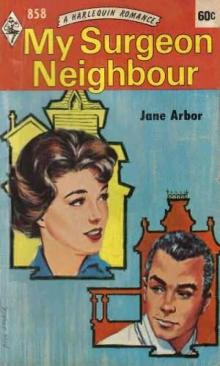 My Surgeon Neighbour
My Surgeon Neighbour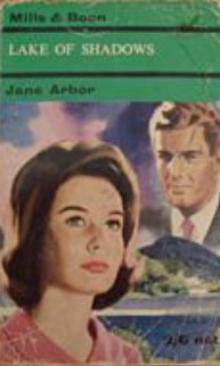 Lake of Shadows
Lake of Shadows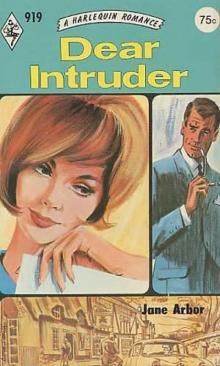 Dear Intruder
Dear Intruder Flash of Emerald
Flash of Emerald Return to Silbersee
Return to Silbersee Far Sanctuary
Far Sanctuary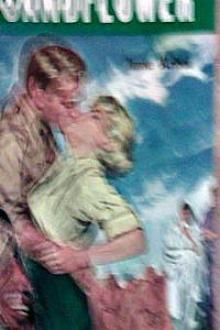 Sandflower
Sandflower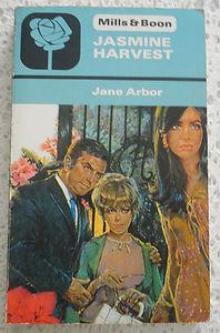 Jasmine Harvest
Jasmine Harvest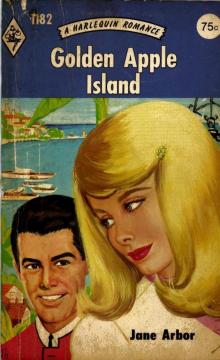 Golden Apple Island
Golden Apple Island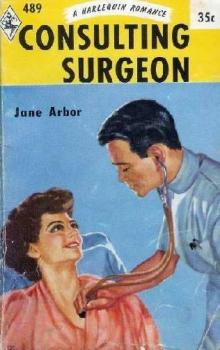 Consulting Surgeon
Consulting Surgeon Pact without desire
Pact without desire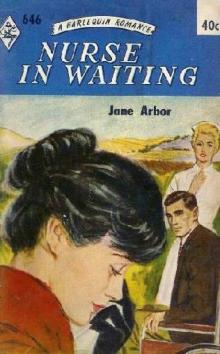 Nurse in Waiting
Nurse in Waiting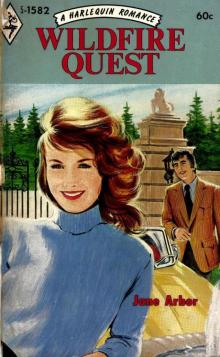 Wildfire Quest
Wildfire Quest Roman Summer
Roman Summer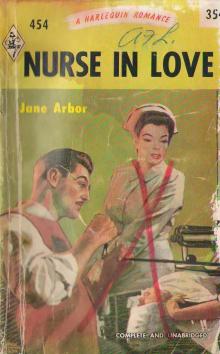 Nurse in Love
Nurse in Love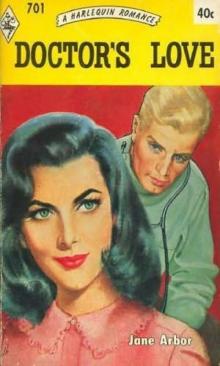 Doctor's Love
Doctor's Love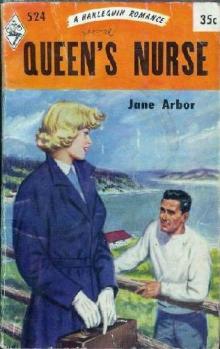 Queen's Nurse
Queen's Nurse Meet the Sun Halfway
Meet the Sun Halfway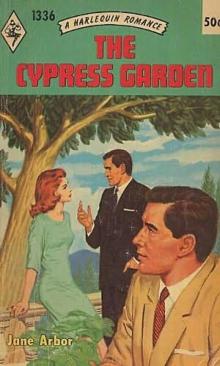 The Cypress Garden
The Cypress Garden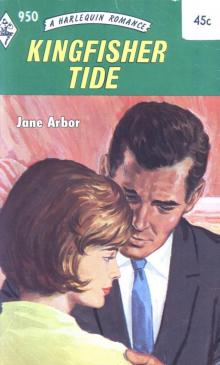 Kingfisher Tide
Kingfisher Tide A Growing Moon
A Growing Moon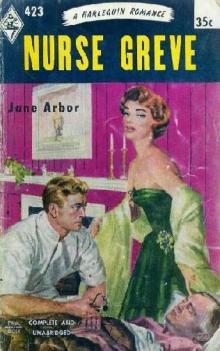 Nurse Greve
Nurse Greve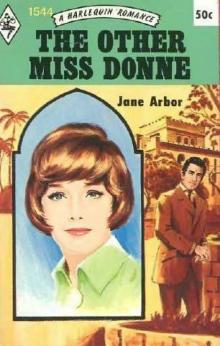 The Other Miss Donne
The Other Miss Donne